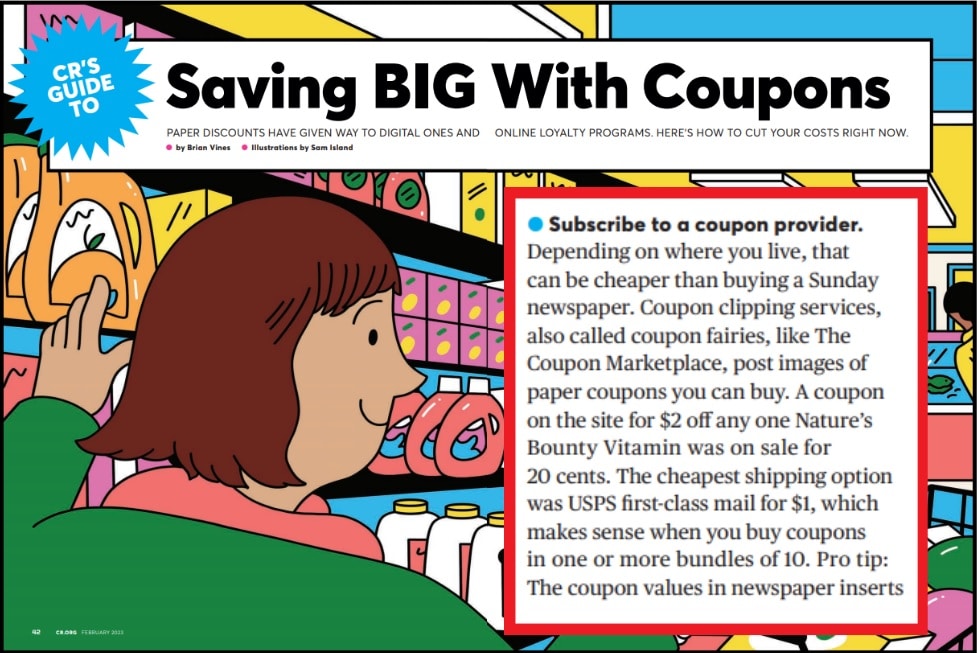
Consumer Reports has a well-earned reputation as a trusted source for advice and information to make you a more well-informed consumer. But some are taking issue with some of the publication’s latest advice about coupons.
The February edition of the magazine, out now, features a series of articles with tips on how to save money with coupons. The advice may not be new to you, if you’ve been around the coupon block a time or two. But casual or non-coupon users can benefit from savings tips like joining store loyalty programs, matching coupons with sales, using rebate apps, and buying coupons from online clipping services.
Wait, what?
Despite the coupon industry’s opposition to the practice, plenty of coupons are bought and sold online. And a lot of them are actually stolen property, or even counterfeit. So the industry doesn’t recommend buying coupons – and it doesn’t recommend that the country’s leading consumer advice magazine endorse such activity.
“Subscribe to a coupon provider,” the Consumer Reports article entitled “How to Save Big With Digital Coupons” suggests. “Coupon clipping services, also called coupon fairies… post images of paper coupons you can buy.” You can even sign up for “a subscription service that will ship whole inserts.”
Where do those inserts come from? You can ask some of the many online coupon sellers who have been charged and convicted of stealing pallets of coupon inserts from newspaper distribution facilities, or working with insiders who steal the inserts for them. Or you could ask those convicted of printing their very own legit-looking but fake coupons to sell.
Back in 2015, the magazine “All You” offered similar advice, and got a public scolding from coupon industry leaders. When asked its reaction to the Consumer Reports article’s advice, the Coupon Information Corporation crafted a statement that it sent to the magazine.
“The recommendation that readers purchase coupons should be strongly reconsidered,” the statement read in part. “In addition to being in violation of the manufacturers’ policies and voiding the coupons, coupons being sold on the internet or by other means may be stolen or counterfeit.”
The CIC also advised caution in following another piece of advice in the article. “Find a Facebook couponing group,” Consumer Reports suggests. “Typing ‘couponing group’ into the social media platform’s search bubble will have you scrolling through groups with as many as 1.5 million followers.”
“While many of these groups are legitimate,” the CIC cautioned, “many also provide false information and have been used by some to engage in criminal activities.”
When asked its reaction to the CIC statement, Consumer Reports responded by amending the online version of the article. “Be aware that the practice is controversial,” it added to the article that suggested buying coupons online. “The Coupon Information Center warns that the coupons could be counterfeit, and says that the practice of selling coupons can violate manufacturers’ policies and void the coupons.” As for joining online coupon groups, an addendum noted that “visitors to these groups should keep an eye out for counterfeit coupons as well as coupon ‘glittering’ or ‘shimmering,’ which is improperly using a coupon to purchase items not intended by the company or store that issued the coupon.”
The printed version of the magazine, of course, doesn’t include these updates. And both the printed and online versions of the articles still include some advice that you might want to think twice about following.
The article “How to Stack Coupons and Get Huge Discounts” features advice from a coupon YouTuber, complete with breakdowns of some of her greatest deals – like the time she stacked two digital manufacturer’s coupons on a single purchase, or combined a total of four buy-two-get-one-free store coupons, which would require the purchase of 12 items, and used them on the purchase of six items instead.
Back when All You suggested that readers buy coupons online, the CIC and Association of Coupon Professionals called the advice “a disservice to readers” and called for a retraction. And All You’s publishers issued a retraction all right – of the entire magazine, announcing just six months later that they were pulling the plug on the publication for good.
Of course, that’s unlikely to happen to Consumer Reports. A few questionable tips about couponing aren’t going to permanently damage the magazine’s 87-year reputation of looking out for consumers. But when it comes to coupons, consumers would do well to be careful about the advice they choose to follow. Because whether it’s someone online or a trusted magazine telling you how coupons can get you something for nothing, the CIC’s longstanding advice holds true – if it seems too good to be true, it probably is.
















Maybe if they started putting all coupons in all papers, we would not have to buy them from coupon sellers. I actually don’t do it regularly, but have in the past. Why? The Save insert is no longer distributed in my local paper. They mail it with the weekly coupons is some areas around me, and I was getting it for a few months, but it’s stopped. I manage to find them in the trash at a nearby post office (oddly, copies delivered to PO Boxes in my zip code get it, but I do not in my home delivered copy). But even then, it’s a minimal version, missing coupons shown in the weekly list posted here. We no longer get Unilever inserts. Proctor & Gamble (whose inserts I used to get in my local paper) had coupons in this week’s Save, but my paper did not have those. So basically no more P&G coupons for me.
So what am I supposed to do if I want to get the coupons that others are getting in their copy of Save if not buy them from someone else?
buy cheap at dollar tree $1.25 per paper. Not all papers are there like the DC Post. But Baltimore Sun is there on saturday and sunday. Make sure there are coupons for the week. Also check doctors offices at the secretary’s desk. Some dermatologists have all scent free coupons for $2 and less amounts too.
These are from the vendor and not copies. Some have lotion coupons also.
and also ask the vendor truck drivers if they have some. And merchandisers in the store also may have some. in some Passover ads there may be mfg coupons in a store insert. If it is a mfg coupons you can use it anywhere. And some stores give out the passover ad in the store. Take all you want since these are not copies but newspaper insert ads.